Insulin: A Primer
Insulin is a hormone that regulates the levels of sugar in your blood. When you eat a meal, the carbohydrate in the meal is broken down into glucose (a sugar used as energy by your cells). The glucose enters your blood. Your pancreas senses the rising glucose and releases insulin. Insulin allows the glucose to enter your liver, muscle, and fat cells. Once your blood glucose starts to come back down, insulin levels come back down too. This cycle happens throughout the day. You eat a meal, glucose goes up, insulin goes up, glucose goes down, and insulin goes down. Insulin levels are typically lowest in the early morning since it's usually been at least 8 hours after your last meal.
Insulin doesn't just regulate blood sugar. It has other effects as well. For example, it stimulates your muscles to build new protein (a process called protein synthesis). It also inhibits lipolysis (the breakdown of fat) and stimulates lipogenesis (the creation of fat).
It is the latter effect by which insulin has gotten its bad reputation. Because carbohydrate stimulates your body to release insulin, it has caused some people to argue that a diet high in carbohydrate will cause you to gain fat. Their reasoning, in a nutshell, goes like this:
High Carbohydrate Diet -> High Insulin -> Increased Lipogenesis/Decreased Lipolysis -> Increased Body Fat -> Obesity
Using this same logic, they argue that a low carbohydrate diet is best for fat loss, because insulin levels are kept low. Their logic chain goes something like this:
Low Carbohydrate Diet -> Low Insulin -> Decreased Lipogenesis/Increased Lipolysis -> Decreased Body Fat
However, this logic is based on many myths. Let's look at many of the myths surrounding insulin.
MYTH:A High Carbohydrate Diet Leads to Chronically High Insulin Levels
FACT:Insulin Is Only Elevated During the Time After a Meal In Healthy Individuals
One misconception regarding a high carbohydrate intake is that it will lead to chronically high insulin levels, meaning you will gain fat because lipogenesis will constantly exceed lipolysis (remember that fat gain can only occur if the rate of lipogenesis exceeds the rate of lipolysis). However, in healthy people, insulin only goes up in response to meals. This means that lipogenesis will only exceed lipolysis during the hours after a meal (known as the postprandial period). During times when you are fasting (such as extended times between meals, or when you are asleep), lipolysis will exceed lipogenesis (meaning you are burning fat). Over a 24-hour period, it will all balance out (assuming your are not consuming more calories than you are expending), meaning you do not gain weight. Here's a graph showing how this works:
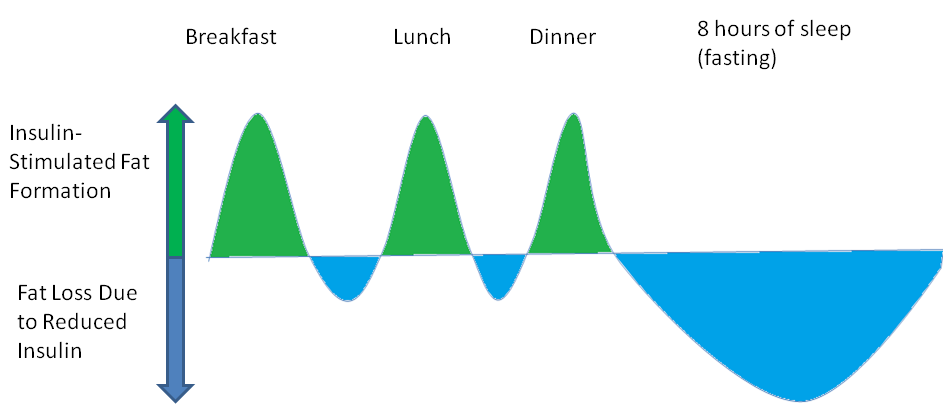
After meals, fat is deposited with the help of insulin. However, between meals and during sleep, fat is lost. Fat balance will be zero over a 24-hour period if energy intake matches energy expenditure.
This is just a rough chart that I made, but the green area represents the lipogenesis occuring in response to a meal. The blue area represents lipolysis occuring in response to fasting between meals and during sleep. Over a 24-hour period, these will be balanced assuming you are not consuming more calories than you expend. This is true even if carbohydrate intake is high. In fact, there are populations that consume high carbohydrate diets and do not have high obesity rates, such as the traditional diet of the Okinawans. Also, if energy intake is lower than energy expenditure, a high carbohydrate diet will result in weight loss just as any other diet.
MYTH: Carbohydrate Drives Insulin, Which Drives Fat Storage
FACT: Your Body Can Synthesize and Store Fat Even When Insulin Is Low
One of the biggest misconceptions regarding insulin is that it's needed for fat storage. It isn't. Your body has ways to store and retain fat even when insulin is low. For example, there is an enzyme in your fat cells called hormone-sensitive lipase (HSL). HSL helps break down fat. Insulin suppresses the activity of HSL, and thus suppresses the breakdown of fat. This has caused people to point fingers at carbohydrate for causing fat gain.
However, fat will also suppress HSL even when insulin levels are low. This means you will be unable to lose fat even when carbohydrate intake is low, if you are overeating on calories. If you ate no carbohydrate but 5,000 calories of fat, you would still be unable to lose fat even though insulin would not be elevated. This would be because the high fat intake would suppress HSL. This also means that, if you're on a low carbohydrate diet, you still need to eat less calories than you expend to lose weight.
Now, some people might say, "Just try and consume 5000 calories of olive oil and see how far you get." Well, 5000 calories of olive oil isn't very palatable so of course I won't get very far. I wouldn't get very far consuming 5,000 calories of pure table sugar either.
MYTH: Insulin Makes You Hungry
FACT: Insulin Suppresses Appetite
It is a well known fact that insulin acutely suppresses appetite. This has been demonstrated in dozens and dozens of experiments. This will be important when we talk about the next misconception...
MYTH: Carbohydrate Is Singularly Responsible for Driving Insulin
FACT: Protein Is a Potent Stimulator of Insulin Too
This is probably the biggest misconception that is out there. Carbohydrates get a bad rap because of their effect on insulin, but protein stimulates insulin secretion as well. In fact, it can be just as potent of a stimulus for insulin as carbohydrate. One recent study compared the effects of two different meals on insulin. One meal contained 21 grams of protein and 125 grams of carbohydrate. The other meal contained 75 grams of protein and 75 grams of carbohydrate. Both meals contained 675 calories. Here is a chart of the insulin response:
Now here's a chart of the blood sugar response:
You can see that, despite the fact that the blood sugar response was much higher in the meal with more carbohydrate, the insulin response wasn't higher. In fact, the insulin response was somewhat higher after the high protein meal, although this wasn't statistically significant.
Some people might argue that the "low-carb" condition wasn't really low carb because it had 75 grams of carbohydrate. But that's not the point. The point is that the high-carb condition had nearly TWICE as much carbohydrate, along with a HIGHER glucose response, yet insulin secretion was slightly LOWER. The protein was just as powerful at stimulating insulin as the carbohydrate.
I can also hear arguments coming like, "Yeah, but the insulin response is longer and more drawn out with protein." That wasn't true in this study either.
You can see in the chart that there was a trend for insulin to peak faster with the high protein condition, with a mean response of 45 uU/mL at 20 minutes after the meal, versus around 30 uU/mL in the high carb condition.
This tendency for a higher insulin response was associated with a tendency towards more appetite suppression. The subjects had a tendency towards less hunger and more fullness after the high protein meal:

Comparison of low protein, high carb and high protein, low carb meals and their effects on hunger and fullness
Here's the results of another study that compared the effects of 4 different types of protein on the insulin response to a meal. This study was interesting because they made milkshakes out of the different proteins (tuna shakes???? YUCK!!!!! Of course some people may remember the tuna shake recipes from the misc.fitness.weights days). The shakes contained only 11 grams of carbohydrate, and 51 grams of protein. Here's the insulin response to the different shakes:
You can see that all of these proteins produced an insulin response, despite the fact that the carbohydrate in the shake was low. There was also different insulin responses between the proteins, with whey producing the highest insulin response.
Now, some might argue that the response is due to gluconeogenesis (a process by which your liver converts protein to glucose). The thought is that the protein will be converted to glucose, which will then raise insulin levels. As I mentioned earlier, people will claim that this will result in a much slower, more drawn-out insulin response, since it takes time for your liver to turn protein into glucose. However, that's not the case, because the insulin response was rapid, peaking within 30 minutes and coming back down quickly at 60 minutes:
This rapid insulin response was not due to changes in blood glucose. In fact, whey protein, which caused the greatest insulin response, caused a drop in blood glucose:
The insulin response was associated with appetite suppression. In fact, the whey protein, which had the highest insulin response, caused the greatest suppression of appetite. Here's a chart showing the calorie intake of the subjects when they ate lunch 4 hours after drinking the shake:
The subjects ate nearly 150 calories less at lunch when they had whey protein, which also caused the greatest insulin response. In fact, there was an extremely strong inverse correlation between insulin and food intake (a correlation of -0.93).
Here's data from another study that looked at the insulin response to a meal that contained 485 calories, 102 grams of protein, 18 grams of carbohydrate, and almost no fat:
You can see that the insulin response was exaggerated in the obese subjects, probably due to insulin resistance. Here's a chart of the blood glucose response. You can see there was no relationship between the glucose response and insulin, which was similar to the study discussed earlier.
The fact is that protein is a potent stimulator of insulin secretion, and this insulin secretion is not related to changes in blood sugar or gluconeogenesis from the protein. In fact, one study found beef to stimulate just as much insulin secretion as brown rice. The blood sugar response of 38 different foods could only explain 23% of the variability in insulin secretion in this study. Thus, there's a lot more that's behind insulin secretion than just carbohydrate.
So how can protein cause rapid rises in insulin, as shown in the whey protein study earlier? Amino acids (the building blocks of protein) can directly stimulate your pancreas to produce insulin, without having to be converted to glucose first. For example, the amino acid leucine directly stimulates pancreas cells to produce insulin, and there's a direct dose-response relationship (i.e., the more leucine, the more insulin is produced).
Some might say, "Well, sure, protein causes insulin secretion, but this won't suppress fat-burning because it also causes glucagon secretion, which counteracts insulin's effects." I mentioned earlier how insulin will suppress lipolysis. Well, some people think that glucagon increases lipolysis to cancel this out.
The thought that glucagon increases lipolysis is based on 3 things: the fact that human fat tissue has glucagon receptors, the fact that glucagon increases lipolysis in animals, and the fact that glucagon has been shown to increase lipolysis in human fat cells in vitro (in a cell culture). However, what happens in vitro isn't necessarily what happens in vivo (in your body). We have a case here where newer data has overturned old thinking. Research using modern techniques has shown that glucagon does not increase lipolysis in humans. Other research using the same techniques has shown similar results. I will also note that this research failed to find any lipolytic effect in vitro.
It should be remembered why glucagon is released in response to protein in the first place. Since protein stimulates insulin secretion, it would cause a rapid drop in blood glucose if no carbohydrate is consumed with the protein. Glucagon prevents this rapid drop in blood sugar by stimulating the liver to produce glucose.
Insulin: Not Such a Villain After All
The fact is that insulin is not this terrible, fat-producing hormone that must be kept as low as possible. It is an important hormone for appetite and blood sugar regulation. In fact, if you truly wanted to keep insulin as low as possible, then you wouldn't eat a high protein diet...you would eat a low protein, low carbohydrate, high fat diet. However, I don't see anybody recommending that.
I'm sure some are having some cognitive dissonance reading this article right now. I know because I experienced the same disbelief years ago when I first discovered this paper and how protein caused large insulin responses. At the time, I had the same belief that others have...that insulin had to be kept under control and as low as possible, and that spikes in insulin were a bad thing. I had difficulty reconciling that study and my beliefs regarding insulin. However, as time went on, and as I read more research, I learned that my beliefs regarding insulin were simply wrong.
Now, you may be wondering why refined carbohydrates can be a problem. Many people think it's due to the rapid spikes in insulin. However, it's obviously not the insulin, because protein can cause rapid spikes in insulin as well. One problem with refined carbohydrate is a problem of energy density. With refined carbohydrate, it is easier to pack a lot of calories into a small package. Not only that, but foods with high energy density are often not as satiating as foods with low energy density. In fact, when it comes to high-carbohydrate foods, energy density is a strong predictor of a food's ability to create satiety (i.e., low-energy density foods create more satiety). There are other issues with refined carbohydrate as well that are beyond the scope of this article.
The bottom line is that insulin doesn't deserve the bad reputation it's been given. It's one of the main reasons why protein helps reduce hunger. You will get insulin spikes even on a low-carb, high-protein diet. Rather than worrying about insulin, you should worry about whatever diet works the best for you in regards to satiety and sustainability. As mentioned in a previous article, individual responses to particular diets are highly variable and what works for one person will not necessarily work for another. I will be writing a post in the future on the need for individualized approaches to nutrition.
Click here to read part 2 of this series on insulin.

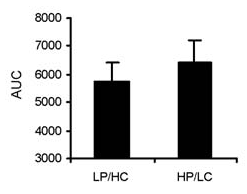
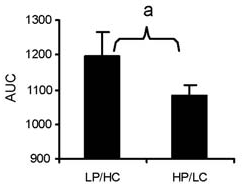

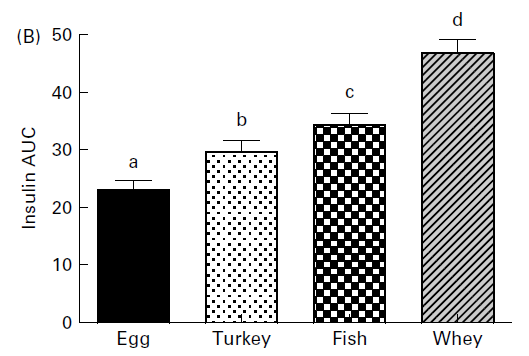
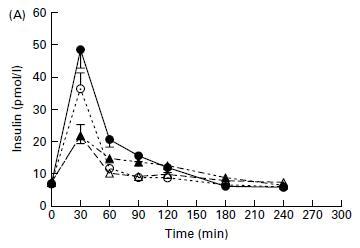
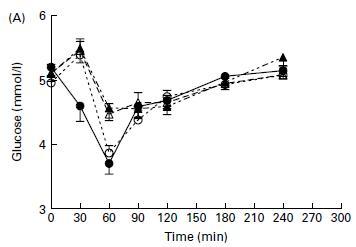
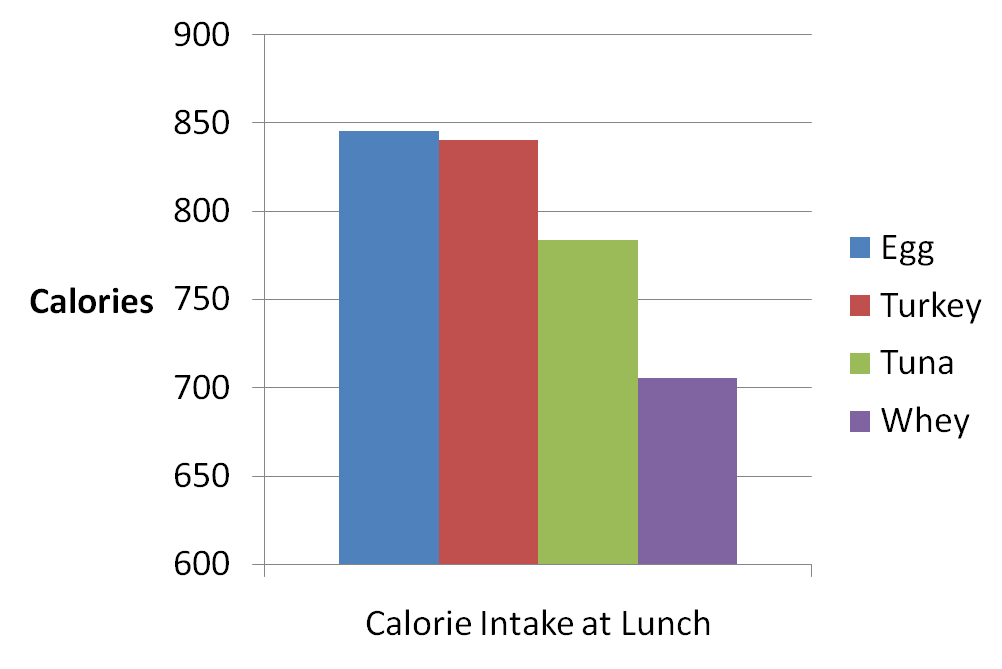
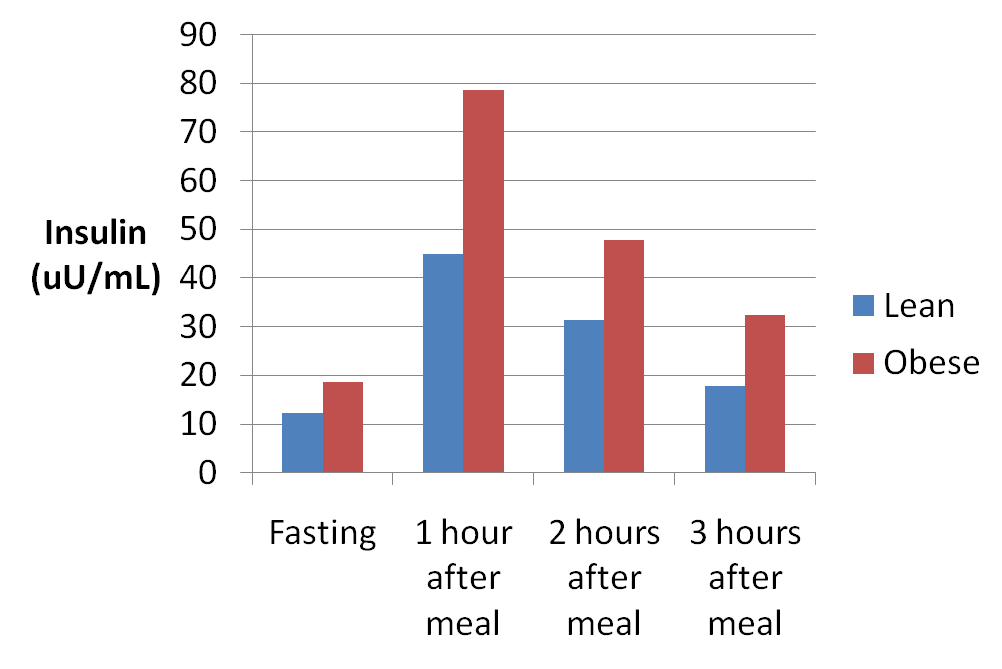
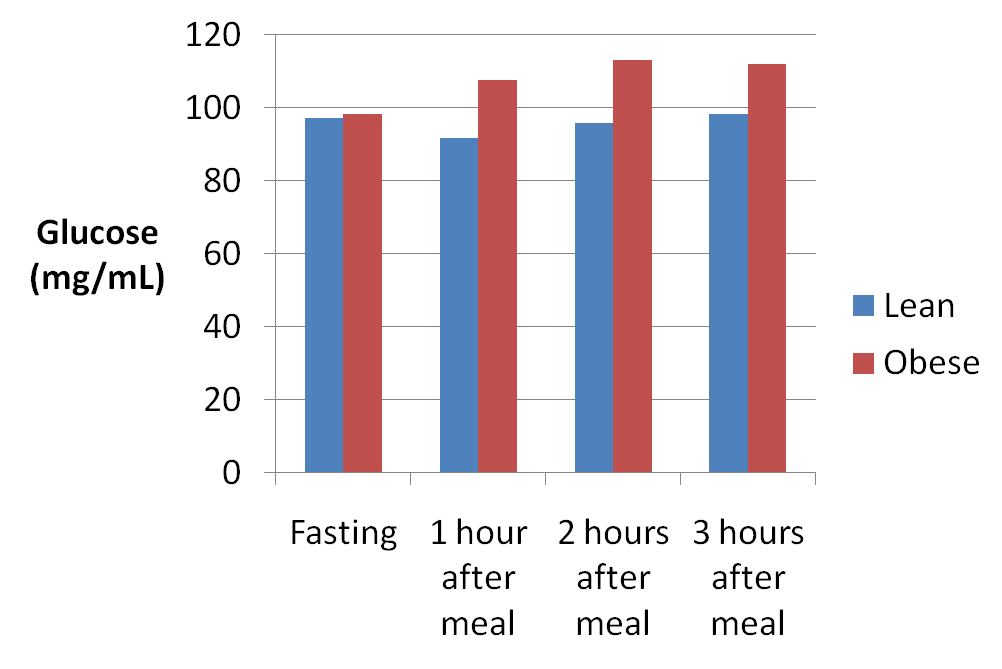
The amounts of carbohydrates in these stuies was laughable small. 18 grams! that isn’t even one third of what is seen in the ora glucose tolerance test. The effects of insulin and high carbohydrates are well known, from loss of beta cell function in the pancreas and its direct toxicity to beta cells of the pancreas, to its effects on sodium reabsorption in the kidney, to effects on inflammation and its relationship to cardiovascular disease. Every leading physician has come to recognize the effects of hyperinsulinemina on the person. Please, please look at the data. Please look at the longevity… Read more »
oops 🙂 posted this in the wrong spot at first. Enjoyed your article, but I feel like you missed the mark a bit in proving that insulin responses due to protein intakes are not in fact due largely in part to gluconeogenesis, and I’ll quickly use your charts to explain why. We see that egg and whey protein meals caused the sharpest insulin response. These are also the two fastest to break down, thus causing a more dramatic spike of blood aminos, which requires an immediate response to regulate homeostatic conditions. Now also, given that we see a normal lowering… Read more »
I was a low carber for over 10yrs, from the Atkins to the Dukan diet and yes they all helped me lose weight. That’s 10yrs!! I am not stating my experience in dieting but the fact that I had to continue dieting for this amount of time and i never truly reached my goal weight for any longer than 3 months. I actually bounced back well over my starting weight once I hit my thirties and gave up any restrictive dieting for a short term (I hit 110kg) It is forums like this that let me to do my own… Read more »
It is not a coincidence that our brain runs on carbs and our bodies prefer carbs as our primary fuel source. Countless medical sources back up this fact. If we eat 5 burgers vs the equivalent calories of bread (say 10 buns), won’t we still gain weight? Ultimately, everything is converted to glucose in the body whichever macronutrients we are discussing (carb fat or protein). The key to weight loss for me (and I am mostly a vegetarian who survives on complex carbs including lentils and some proteins from eggs, fish, dairy on occasion) was no snacking, 2 meals a… Read more »
so high fat low carb and moderate protein is bad?
keto is bad?
No. High fat, low carb, moderate protein seems to work well for a large number of people regarding weight loss. This diet will not work for everybody though. Some find that they need to make the diet a plain one. (lessen the good taste, suddenly food doesn’t look so appetizing anymore). You do not want to ingest too much protein because it can work as a poison unless there is adequate fat in your diet to prevent protein overdose. I liked this analogy the best. Imagine eating from a stovetop that is COVERED in cookies and cakes just piled up… Read more »
Actually, the biological process of fat accumulation through insulin from consumption of high carbohydrate diets is about as well understood as any by biologists in the field. The real question is whether there exists any biological processes of fat accumulation that do not involve consumption of carbohydrates at their core. That is, are there any plausible biological mechanisms by which eating too much fat and protein (but not carbs) could lead to excess fat accumulation. So far, I know of none. The lazy argument that I hear most often is that people eat too many calories, thereby causing fat gain.… Read more »
Mike, it’s absolutely possible to store fat when insulin is low, have you not heard of Acylation Stimulating Protein (ASP)? I suggest you start looking more into the counter-arguments against Taubes position (This site, Carbsanity.blogspot, Lyle Mcdonald and others) and lay off the smugness in your posts in the mean time as you may look back in embarrassment in years to come.
Hmmmm. You said that the following is a myth: “Carbohydrate Drives Insulin, Which Drives Fat Storage”, yet you did nothing whatsoever to “dispell” it. If anything, you actually agreed with it entirely. First, you agreed that carbohydrates stimulate insulin production. Second, you also agreed that insulin plays a role in lipogenisis. Now put 1+1 together… where’s the myth again??? A few other points: 1. You point out that other hormones have a role in regulating fat storage. Of course they do. The real question is to what extent different hormones have an impact on the regulation of fat tissue. You… Read more »
This guy wont reply to this post bc he knows he is wrong. Come on respond to this reply. or you know you are wrong
I don’t reply because if I were to reply to every single person who makes comments on my site, my entire day would be nothing but arguing with people on the internet. My priorities are (in no particular order): 1. Writing articles for my paying subscribers 2. Dealing with my clients 3. Responding to comments of my paying subscribers 4. My full-time day job (which is not this site) 5. My part-time job as a securities trader 6. My family and home responsibilities Responding to Mike or such individuals is far, far down on my priority list. Mike is clearly… Read more »
James, im sure you have time. you obviously just don’t know how to reply to such a solid counter argument given here by mike.
Robert, that’s pretty arrogant of you to think you know my schedule and how much time I really have. Mike’s counter argument would require a lengthy detailed reply which will take more time than I currently have. If you or Mike want priority in terms of my responses, you would have to be a paying subscriber. Random people who leave comments on my site are the lowest on my priority list.
well, you certainly had time/will to reply this 2 coments, despita their don’t relate to any of your “priorities”, but still didn’t managed a way to answer Mike’s well observed points.
The debate would only be beneficial to everyone who reads, but it just seems you’re not interested in it.
I responded because it only took me 60 seconds to type it. It would take me significantly longer to respond to Mike’s points, an hour or longer. You obviously have a very distorted concept of time, but perhaps that doesn’t surprise me since you seem to think everyone has time to engage in lengthy debates with random people on the internet. Perhaps this excerpt from an Anthony Colpo post applies to you? These individuals completely fail to realize that providers of free web content actually have no obligation to provide said content. When someone sits down to write an Internet… Read more »
Actually, my time perception is fine thank you, at least fine enough to aknowledge that from December 12th several hours have passed. Again if it would be of your interest i believe you could already replyed to it. I’m perfectly aware it’s up to you to reply to whoever and whenever you want, but come on, the point here is that refuting Mike’s arguments would greatly improve the debate. Don’t get me wrong, i’m not picking on you but i like to see diferent perspectives on this subject and feels like a lost oportunity to do it. This is such… Read more »
A few things I want to say to your points: 1) You are somewhat correct about the excess blood sugar which may lead to fat storage, but if you recall, he pointed out a 23% discrepancy. It is not as dramatic as you imply. What proof do you have that the high blood sugar is converted to fat? Are you a scientist? Can you prove or disprove this? Did it occur to you that it is the type of “carbs” you are eating which drives responses in the body? “When the body is flooded with sugary treats, it launches an… Read more »
There are so many things that do not apply to a “damaged metabolism” here. More on my Site.
Fredt, why don’t you define a “damaged metabolism” and why the things here don’t apply
F*cking good article! My mind is blown, will tweet and post on our facebook wall. I’ve always been pro-carb and it annoys me greatly when they are unfairly vilified as a basis for paleo and other ridiculousness.
Thank you, PropaneFitness. Yes, I agree with you, the whole “carb villification” movement has been quite ridiculous!
I’ve experimentet lots over the last 2-3 years with “diets”. I haven’t had better success with anything other than “low-carb/high fat” dieting. It made me lose 34 lbs in 90 days and get six pack abs, TONS of muscle and strength… I am now eating carbs, I’ve gained 20 lbs and my abs are gone…
OOOOPS
So what’s this got to do with insulin?
I think the point most people are making is that you wrote an article out of spite and malice. This isn’t to help people, it’s to hurt someone, maybe Taubes, maybe someone else. All I know is that you cherry-picked your studies and EVERYONE sees it. You ought to be ashamed of yourself….
I think the point most people are making is that you wrote an article out of spite and malice. First, you have no evidence that this was written out of spite or malice. Second, even if it was, it still does not refute the information provided in the article. The motivation for writing an article is irrelevant to whether the content is factual. This isn’t to help people, I’ve had numerous people contact me personally and told me this article helped them and educated them. You really have no clue why I wrote this article, do you? All I know… Read more »
I found it very interesting that non carbohydrate containing foods such as eggs, beef, fish and cheese promote increased levels of blood glucose (Am. J. Clin. Nutr. 66: 1264-1276) as measured by glucose AUC at 120 minutes after ingestion. Your argument that glucagon stimulates the liver to release glucose to avoid insulin induced hypoglycemia makes sense. Is it know whether this effect is due to glycogenolysis or gluconeogenesis or both? It would be fun to have a debate between you, Gary Taubes and maybe Gerald Reaven. Thanks, Jeff